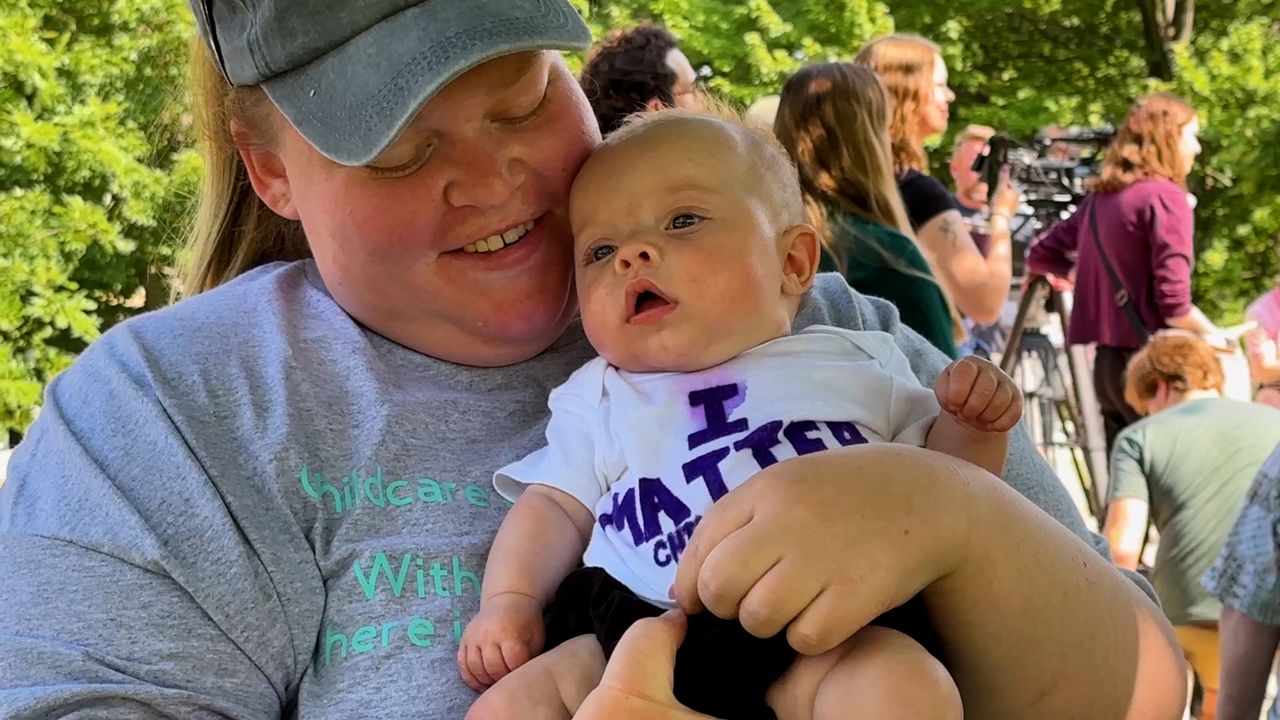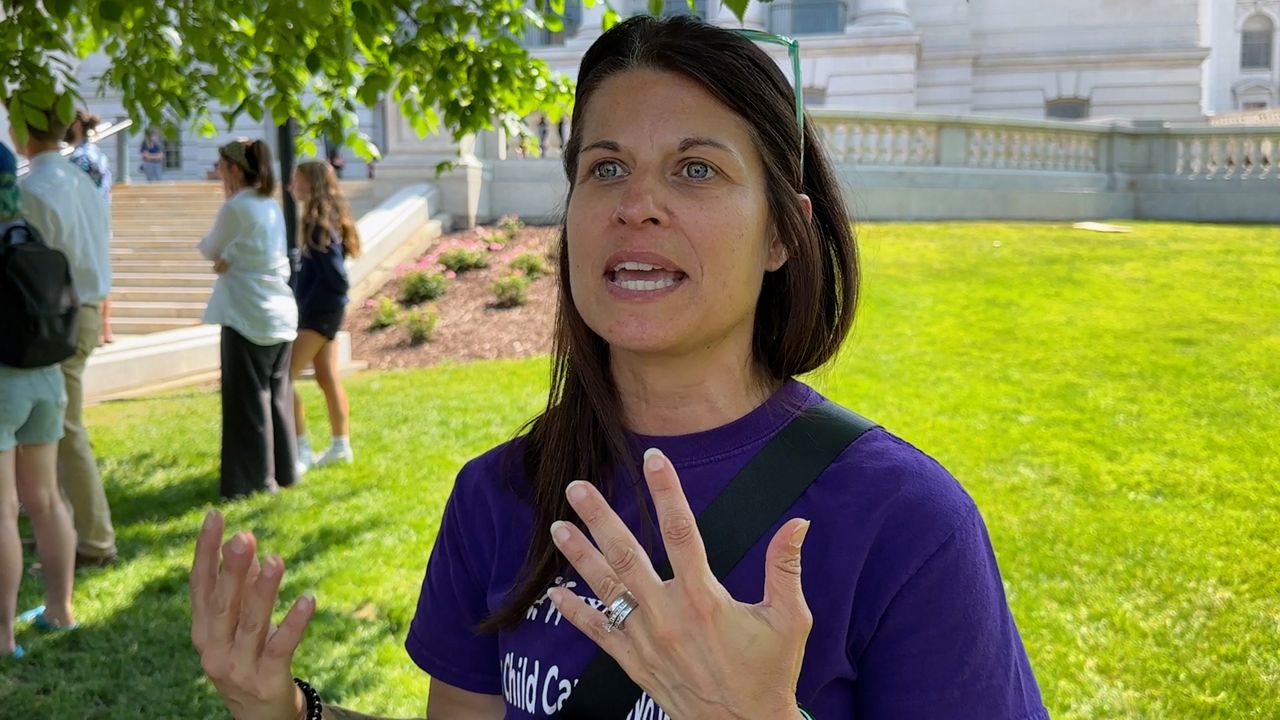MADISON, Wis. — Money for a child care subsidy program, created during the COVID-19 pandemic using federal funds, will run out early next year for providers across the Badger State.
During an early morning vote last Friday, the Joint Finance Committee (JFC), which has been working to rewrite Gov. Tony Evers’ budget, decided not to fulfill his request for $340 million of state funds to keep the Child Care Counts program afloat.
Since January, 181 regulated child care providers have shut their doors, with 15 closing their location but reopening in a different setting, according to the state’s Dept. of Children and Families.
Providers and parents alike, several of whom were worried their facility could be next to close, took their concerns to the Capitol again on Tuesday, with a rally held on the steps.
Anna Cary of Monroe has worked at The Growing Tree in nearby New Glarus for the last decade. She attended Tuesday’s rally with her 16-week-old daughter, Flora, to share her concerns.
“Are we going to be able to keep our doors open? Are we going to be able to keep child care,” Cary asked. “I’m just worried for job security, honestly. I’m worried for, you know, making a livable wage. That’s really been stressing me out lately.”

Small business owners said they also feel stressed as wait lists for care grow while the size of their staff shrink, especially since the pandemic.
Joan Beck, who operates Willow’s Christian Child Care Center in Iron Ridge, isn’t worried her doors will close, but she knows shutting some parents out can’t be avoided as other care centers go out of business.
“This bottom line is there’s no room, and if I cut my staff’s bonuses or wages, I’ll lose my staff,” Beck explained. “So, it’s a catch-22. It’s going to end up that the families that make the most money will be able to afford to stay in my program, so I’m not meeting the needs of everyone in Wisconsin.”
The subsidized funds from the Child Care Counts program had helped providers stay open during the pandemic and cover the costs of recruiting and retaining their staff. Though money from the program has been reduced earlier than expected, the assistance has helped keep costs down for parents while also providing a competitive wage for workers.
“I mean [a] starting wage at $15 an hour is common,” Beck added. “McDonald’s, you know, Culver’s, Walmart is even more than that, and how do we compete with starting wages that high if we don’t have money to put that into our wages too.”
Several Democrats joined Tuesday’s rally to call on Republicans, who control the Legislature, including the budget-writing committee, to add the funds back into the budget bill as an amendment.
Republicans, however, don’t feel as though it is a simple ‘yes’ or ‘no’ decision. Though Wisconsin has a projected $6.9 billion surplus, some leaders are concerned funding the program could create future obligations to cover the cost of it in the future.
“While the state has a surplus, only $2.5 billion of it is ongoing,” State Sen. Howard Marklein, R-Spring Green, explained in a statement. “The JFC has prioritized existing, ongoing state operations such as K-12 education, road maintenance and repair, health care and other current programs for these ongoing funds. These are the core programs and services that we must pay for first.”
Marklein, who is co-chair of the Joint Finance Committee, said the members allocated $95 million to several existing child care related programs, including:
- $45 million for the Wisconsin Shares program, which provides subsidies for low-income families to pay for child care
- $30 million for Quality Care for Quality Kids, which will fund the resumption of YoungStar bonuses paid directly to child care centers
- $5 million for REWARD stipends that are paid directly to child care workers
- $15 million to create a Child Care Revolving Loan Fund to help child care facilities with improvements, upgrades and other needs
“The Republican motion provides targeted support for child care affordability and accessibility by increasing financial support for the families that need it most, funding several initiatives to increase child care capacity and more than doubling funding for child care provider recruitment and retention,” State Rep. Mark Born, R-Beaver Dam, who serves as the committee’s Assembly co-chair, said in a statement.
Tricia Peterson, who was at the rally and is the owner of Future All Star’s Academy in Juneau, balked at the idea of a loan program.
“Who the heck in their right mind would get a loan right now to start a child care center,” Peterson questioned. “Nobody, so, take that $15 million and put that into Child Care Counts, start something, start somewhere, I think that’s the bottom line. If we can’t do $340 [million], start with the $15 million. We don’t want a loan.”

Many parents, who could face rising costs, don’t want to give up their jobs either. For Cary, she would have to think about staying home if she wasn’t already employed by a child care center where she will eventually bring her daughter to work.
“I don’t think it would be worth me working if I had to pay full price for child care,” Cary said. “I would come out about even, so I might as well just stay home, but I can’t afford to stay home either.”
The overall budget package still needs approval from the full Assembly and Senate before going to the governor, which is why many of those who came to the Capitol on Tuesday still held out hope for a change to put money for the Child Care Counts program back into the spending bill.


